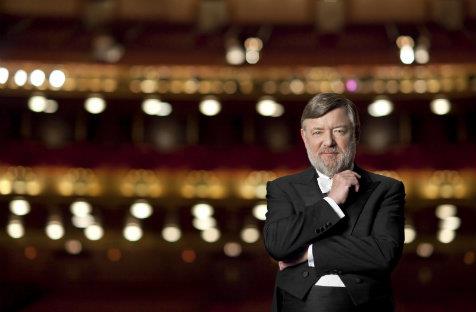Although the title work, Thus Spake Zarathustra, was not performed until after interval, anticipation of it dominated both the programming and the audience mood.
Berlioz’s Overture to his comic opera Beatrice and Benedict was a charming – if lightweight – piece of program music, suggesting themes from the Shakespeare-inspired work. Recalling the Bard’s own words the music had elements of tragical-comical-historical-pastoral – with a leaning towards pastoral.
Matters moved quickly from a quiet opening to a satisfyingly big sound to sweet and reflective. A flute solo with subdued strings segued into a peasant-style dance in a work that showed off individual sections of the orchestra and the strength of tutti playing.
Sir Andrew Davis conducted energetically to achieve the range of dynamics he wanted, and showed his satisfaction with the result by virtually dancing on the podium. He took an entirely different approach in the next work, Mozart’s Violin Concerto No.5 in A, K219, turning his attention from the pared-down orchestra to leading and encouraging the young soloist, Ji Won Kim.
A recent ABC/Symphony Australia Young Performer of the Year, Ji Won Kim stepped up at short notice when the scheduled soloist cancelled his 2013 Australian tour. Like the conductor himself, she showed an appreciation of the delicacy of Mozart and the all-important phrasing that underlies the composer’s distinctive sound.
The orchestra too had plenty of time to establish its Mozartian credentials before the violin solo entered and signalled a change of mood; a sustained sweet passage was quickly succeeded by an allegro, with technical challenges easily met. A typical cadenza with trills gave way to an extended solo, in which Kim’s bowing skilfully created the illusion that there were two instruments playing.
This technique was notable in the second movement as well, with Kim’s high notes soaring over a sympathetic accompaniment by strings, French horns and wind. The final movement is well known in its own right, and Sir Andrew did well to keep the tempo in check – with Turkish elements among other complexities, this music can easily become ragged.
It was a tribute to all players, but notably the soloist and conductor, that the music appeared fresh and charming throughout. The performance was greeted with applause, flowers and hand-kissing, and one expects that Ji Won Kim can look forward to much more of the same in her career, now well and truly launched.
After interval there was a contrast in style with Thus Spake Zarathustra, the massive work that emerged from Richard Strauss’s travels, both actual and philosophical. The music – or at least its opening – is best known to film buffs as accompanying the opening credits in Stanley Kubrick’s 2001: A Space Odyssey, in the ‘Dawn of Man’ sequence and later at a seminal moment for astronaut David Bowman.
For many, the powerful memory of that film was the main attraction of this concert. But, unfortunately, some in the audience near us were suddenly struck with recognition – and had to excitedly relay that thought to their neighbours. At this moment one was very grateful for the augmented MSO’s ability to drown out conversation, in the most artistic manner, of course.
Sir Andrew Davis and the MSO revealed a work of massive scope, great complexity and contrasts, and huge emotional power. Amongst at times frenetic (musical) activity the conductor remained engaged and aware of each section, if not each instrument in the orchestra. Although energetic, Sir Andrew has revealed in his performances this week that he is not one for flamboyant unnecessary gestures – clearly they are not needed to achieve the magnificent sound we heard.
Swept up in the music I noted only good things about the performance, as the violins (echoed by the winds) reached for the heights, while soon after the lower strings produced an ominous sound.
Brass and percussion did much to link the music with that of Wagner, as did the two harps. To be fair, every member of the orchestra – and a great many guests – should be singled out for praise but I will name just one: Geoffrey Payne, whose bell-like trumpet signalled changes in the music and was a shining example of the great musicianship in this orchestra.
What a great week they – and their audiences – have had!
Rating: 4 stars out of 5
Thus Spake Zarathustra
Melbourne Symphony Orchestra
Conductor: Sir Andrew Davis conductor
Berlioz – Beatrice and Benedict: Overture
Mozart – Violin Concerto No.5
Strauss – Thus Spake Zarathustra
Hamer Hall, Melbourne
2 May
Additional performances:
Friday 3 May at 8pm Costa Hall Geelong
Saturday 4 May 2013 at 2:00pm Hamer Hall





